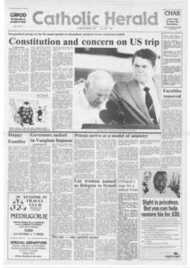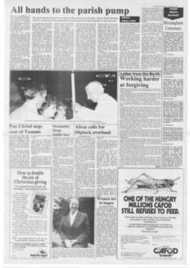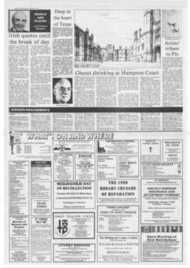Page 3, 18th September 1987
Page 3

Report an error
Noticed an error on this page?If you've noticed an error in this article please click here to report it.
Tags
Share
Related articles
Now The Laity Start Their Vatican Two
Wholehearted Response To The Council
Was It Really 20 Years Ago?
No Second Class Role For Laity
Portsmouth Digs The Footings For Synod In Rome
All hands to the parish pump
The synod opens in Rome in two weeks to discuss the role of the laity. Canon Charles Walker calls for a shake-up in the organisation of the parish to bring lay people to the forefront
ONE of the challenges for Catholics evoked by the Anglican report, Faith in the City is this: we commonly see small Anglican congregations in run-down urban areas zealously involved in community affairs — how is it that relatively large Catholic congregations in the same areas exercise much less influence in the wider community?
We can offer some explanations: most Catholic parishes with hundreds of people attending Mass on Sundays, with a school to be looked after, sick elderly and distressed people to be visited, hospitals and other institutions to be served, organisations and maybe a parish club to manage, can easily absorb the energies of one or two, and sometimes three, parish clergy.
There is also the habit of low profile on the part of Catholic clergy and a tacit yielding of the secular ground to the Anglicans who are, after all, "the established Church".
Probably, the most important explanation of all is that there has been too little training in social awareness in Catholic seminaries, in spite of the richness of Catholic social teaching, and a minimal sense of the lay apostolate even though the Catholic Church possesses a sharper vision of this and a deeper experience than any other branch of Christendom.
After the worship of God, the first necessary thing for Catholic parish communities in inner-city areas (as indeed in any area) is to develop a sense of responsibility for the wider communities in which they are set. We should be constrained both by a spirit of service and by a spirit of evangelism. Generally speaking, nothing much happens unless the clergy provide the orientation and the spur but the actual involvement in community affairs is essentially a work of lay apostolate.
The processes by which a sizable congregation can become an apostolic community have to be carefully studied. Probably, the majority of parishioners will not be able to heed the call to extra involvement because they are already fully extended. Nevertheless their witness as faithful Catholics and good
neighbours is part of apostolate of the parish. The key to apostolic development in a parish, however, is groups.
Sermons on Sundays and messages in the newsletter are valuable "conditioners" but they will not in themselves orientate the parish. People have to be brought together in manageable numbers of six, eight or ten. An average urban parish ought to be able to form and sustain a variety of groups. Maybe some will come together on a neighbourhood basis; there can be a wide variety of common interest groups — of workers, students, young marrieds, elderly people, professionals and many sorts of young people. A family can be a very effective apostolic unit.
Some groups will meet for action, others will be concerned mainly with prayer. Many groups will constitute themselves "until further notice", others will come together for a particular purpose and then disband. Some parishes already exist with a considerable net-work of differing groups. In
at least one instance the push has come not from the clergy but from a husband and wife team.
In groups, ordinary people can engage with one another; form relationships, learn, give each other mutual support and perceive tasks that need to be done. Nearly always experience should be the starting point, not ideas or doctrines. There is a great deal of understanding about human and apostolic growth in the Young Christian Workers (YCW) and Family and Social Action (FSA) movements.
These movements in Britain, and their counterparts in other countries, have produced splendid lay apostles for the past 50 years. Indeed, their experience of the lay "apostolate in life" had important influence on several of the decrees of the second Vatican Council including a decisive influence on the actual decree on the Apostolate of the Laity. Through the YCW and FSA, several generations of men and women, many with little formal education, have brought a Christian influence to bear in the trade unions, social services, education and public life, not to mention the part they have played in their parishes and local communities. Their apostolic training has been through the uniquely effective See-Judge-Act method of enquiry which has taught them how to notice, how to evaluate and how to carry thinking and discussion into appropriate action.
The Grail, too, has done a great deal to stimulate apostolic groups and the Legion of Mary with a different orientation and purpose also has valuable experience.
The group is the characteristic unit of the lay apostolate. A priest who spends part of his time forming and sustaining apostolic groups is very profitably occupied, though he will often find it slow and painstaking work. Nothing much is likely to happen in a parish unless the priest at least acquiesces in this work, but his active leadership, though highly desirable, is not in the last resort essential. In very many parishes even those priests with strong convictions about the lay apostolate and group method can scarcely lift their heads from the pressure of daily pastoral and administrative demands.
The times require a new role in the Church, that of "Parish Lay Animator" (there may be a better name for it). The need for groups — solemnised under the title of "basic communities" — is already clearly understood in South America and lay leadership is also unquestioned. The same is becoming true in North America.
The job of a Parish Lay Animator would be the apostolic formation of lay men and women using the group method. He or she would be part of the parish team along with the priests, deacon and sisters, who often these days are working in parishes. The Lay Animator in a parish should avoid becoming a general factotum, though doubtless there might be some
chores he or she might take on.
Developing the lay apostolate is a specific and demanding task for which there must be a training. Perhaps a year will be necessary in special training locations and a great deal of the substance of the training should be derived from YCW and FSA method.
In small parishes the Lay Animator's role need only be part-time but he or she would still need a training. Large urban parishes would probably need a full-time person, though to begin with a deanery-wide responsibility might be tried.
There are, in fact, a considerable number of young men and women who would welcome this kind of service to the Church. It would require a commitment of three to five years. Many candidates are in colleges and universities and are well-connected with the Catholic chaplaincies. Others could very well come from the YCW and other youth movements.
This new role in the Church would also have the benefit of broadening our understanding of vocations in the Church. The starting point for our thinking about vocation in the Church is that all the baptised have a unique part to play in the life of the Church and of the world around us.
blog comments powered by Disqus











